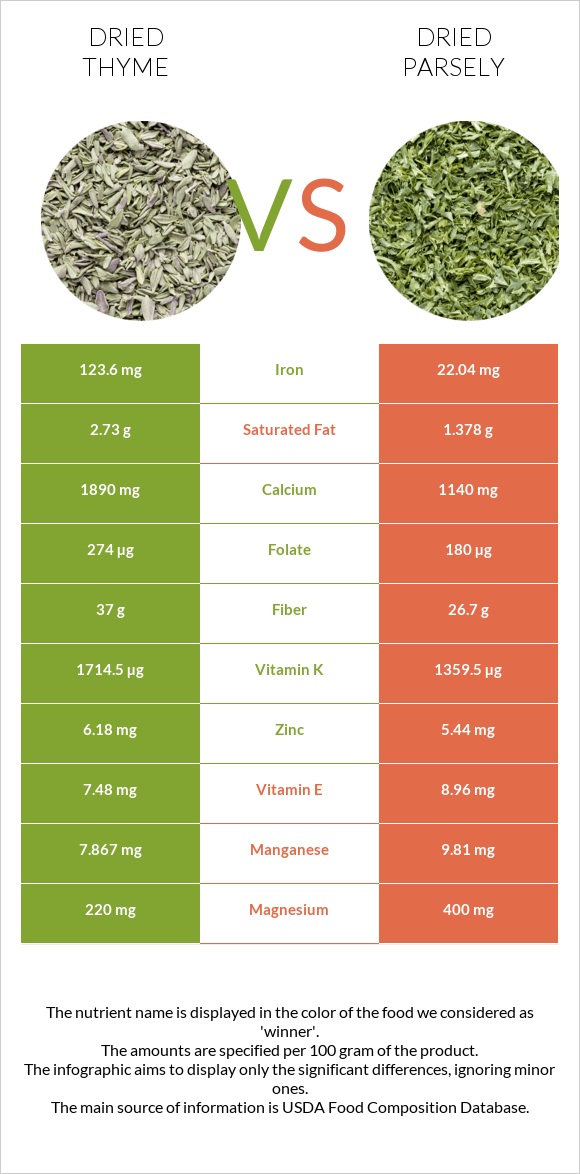Dried thyme vs. Dried parsley — In-Depth Nutrition Comparison
Compare
Differences between dried thyme and dried parsley
- Dried thyme has more iron, vitamin K, calcium, fiber, and vitamin A, while dried parsley has more vitamin B2, manganese, vitamin C, potassium, and magnesium.
- Dried thyme's daily need coverage for iron is 1270% higher.
- Dried parsley contains 2 times less vitamin A than dried thyme. Dried thyme contains 3800 IU of vitamin A, while dried parsley contains 1939 IU.
The food types used in this comparison are Spices, thyme, dried and Spices, parsley, dried.
Infographic

Infographic link
Mineral Comparison
Mineral comparison score is based on the number of minerals by which one or the other food is richer. The "coverage" charts below show how much of the daily needs can be covered by 300 grams of the food.
| Contains more CalciumCalcium | +65.8% |
| Contains more IronIron | +460.8% |
| Contains more ZincZinc | +13.6% |
| Contains less SodiumSodium | -87.8% |
| Contains more MagnesiumMagnesium | +81.8% |
| Contains more PotassiumPotassium | +229.6% |
| Contains more PhosphorusPhosphorus | +116.9% |
| Contains more ManganeseManganese | +24.7% |
| Contains more SeleniumSelenium | +206.5% |
Vitamin Comparison
Vitamin comparison score is based on the number of vitamins by which one or the other food is richer. The "coverage" charts below show how much of the daily needs can be covered by 300 grams of the food.
| Contains more Vitamin AVitamin A | +95.9% |
| Contains more Vitamin B1Vitamin B1 | +161.7% |
| Contains more Vitamin KVitamin K | +26.1% |
| Contains more FolateFolate | +52.2% |
| Contains more Vitamin CVitamin C | +150% |
| Contains more Vitamin EVitamin E | +19.8% |
| Contains more Vitamin B2Vitamin B2 | +497.2% |
| Contains more Vitamin B3Vitamin B3 | +101.3% |
| Contains more Vitamin B6Vitamin B6 | +63.6% |
All nutrients comparison - raw data values
| Nutrient |  |
 |
DV% diff. |
| Iron | 123.6mg | 22.04mg | 1270% |
| Vitamin K | 1714.5µg | 1359.5µg | 296% |
| Vitamin B2 | 0.399mg | 2.383mg | 153% |
| Manganese | 7.867mg | 9.81mg | 84% |
| Vitamin C | 50mg | 125mg | 83% |
| Calcium | 1890mg | 1140mg | 75% |
| Potassium | 814mg | 2683mg | 55% |
| Magnesium | 220mg | 400mg | 43% |
| Fiber | 37g | 26.7g | 41% |
| Protein | 9.11g | 26.63g | 35% |
| Phosphorus | 201mg | 436mg | 34% |
| Vitamin B3 | 4.94mg | 9.943mg | 31% |
| Vitamin B6 | 0.55mg | 0.9mg | 27% |
| Vitamin B1 | 0.513mg | 0.196mg | 26% |
| Folate | 274µg | 180µg | 24% |
| Vitamin B5 | 1.062mg | 21% | |
| Sodium | 55mg | 452mg | 17% |
| Selenium | 4.6µg | 14.1µg | 17% |
| Polyunsaturated fat | 1.19g | 3.124g | 13% |
| Vitamin A | 190µg | 97µg | 10% |
| Vitamin E | 7.48mg | 8.96mg | 10% |
| Choline | 43.6mg | 97.1mg | 10% |
| Copper | 0.86mg | 0.78mg | 9% |
| Zinc | 6.18mg | 5.44mg | 7% |
| Saturated fat | 2.73g | 1.378g | 6% |
| Carbs | 63.94g | 50.64g | 4% |
| Fats | 7.43g | 5.48g | 3% |
| Calories | 276kcal | 292kcal | 1% |
| Monounsaturated fat | 0.47g | 0.761g | 1% |
| Fructose | 0.42g | 1% | |
| Net carbs | 26.94g | 23.94g | N/A |
| Sugar | 1.71g | 7.27g | N/A |
| Tryptophan | 0.186mg | 0.475mg | 0% |
| Threonine | 0.252mg | 1.193mg | 0% |
| Isoleucine | 0.468mg | 1.546mg | 0% |
| Leucine | 0.43mg | 2.794mg | 0% |
| Lysine | 0.207mg | 2.098mg | 0% |
| Methionine | 0.596mg | 0% | |
| Phenylalanine | 1.712mg | 0% | |
| Valine | 0.502mg | 2.021mg | 0% |
| Histidine | 0.718mg | 0% | |
| Omega-3 - ALA | 1.86g | N/A | |
| Omega-6 - Gamma-linoleic acid | 0.016g | N/A | |
| Omega-6 - Linoleic acid | 1.248g | N/A |
Macronutrient Comparison
Macronutrient breakdown side-by-side comparison
Protein:
9.11 g
Fats:
7.43 g
Carbs:
63.94 g
Water:
7.79 g
Other:
11.73 g
Protein:
26.63 g
Fats:
5.48 g
Carbs:
50.64 g
Water:
5.89 g
Other:
11.36 g
| Contains more FatsFats | +35.6% |
| Contains more CarbsCarbs | +26.3% |
| Contains more WaterWater | +32.3% |
| Contains more ProteinProtein | +192.3% |
~equal in
Other
~11.36g
Fat Type Comparison
Fat type breakdown side-by-side comparison
Saturated fat:
Sat. Fat
2.73 g
Monounsaturated fat:
Mono. Fat
0.47 g
Polyunsaturated fat:
Poly. Fat
1.19 g
Saturated fat:
Sat. Fat
1.378 g
Monounsaturated fat:
Mono. Fat
0.761 g
Polyunsaturated fat:
Poly. Fat
3.124 g
| Contains less Sat. FatSaturated fat | -49.5% |
| Contains more Mono. FatMonounsaturated fat | +61.9% |
| Contains more Poly. FatPolyunsaturated fat | +162.5% |


